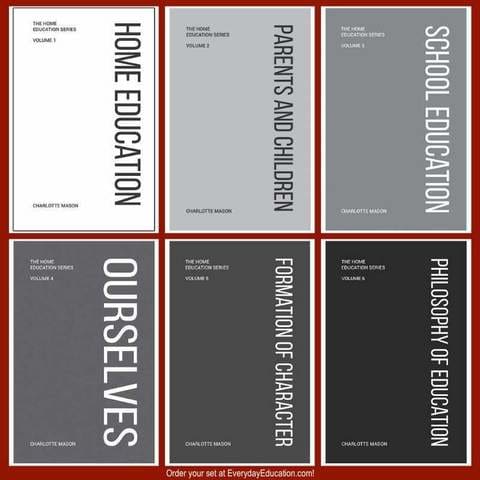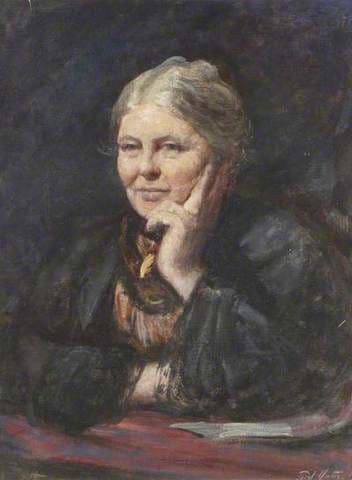Who is Charlotte Mason?
Charlotte Mason (1842 – 1923) was a British educator who believed that all children deserve a wide and liberal curriculum. She developed simple, effective ways of teaching, and she wrote books that can help any parent learn to teach their children well.
Charlotte Mason will help you learn to teach
Through all the years of homeschooling my boys, there was one series of books that I turned to again and again. Not just because they made way more sense than anything else I read on the subject of education, but because they are rich with thoughtful ideas that continue to unfold year after year. My copies of these books are heavily underlined, annotated, and sticky-noted, and I still refer to them often. As teacher-training volumes, they have no parallel.
What are these amazing books? The Charlotte Mason Home Education series. My first introduction to them was through Susan Schaeffer Macaulay's For the Children's Sake, and I still recommend that as a wonderful introduction to Charlotte Mason's ideas.
Because Mason was writing these volumes 100+ years ago, they are not speedy reading, but they are incredibly rewarding. Mason is British, so there will be unfamiliar expressions and vocabulary, but with a bit of thought it is easy to gather meaning from the context.
The Home Education series includes six books:
- Home Education: Training and Educating Children Under Nine (elementary grades)
- Parents and Children: The Role of the Parent in the Education of the Child (Essays originally published in the Parents' National Educational Union [PNEU] magazine for "for parents who are making a practical study of the principles of education.")
- School Education: Developing a Curriculum (Working with the middle grades, with specific examples of how — and how not — to teach.)
- Ourselves: Improving Character and Conscience (Two character-training volumes in one — one for pre-teens and the other for teens, written directly to students but thought-provoking and helpful at any age.)
- Formation of Character (Examples of working with character issues, stories illustrating the correction of bad habits, and advice on making the most of the teen years.)
- A Philosophy of Education (Focused on older students and the "why" of everything.)
How to read Charlotte Mason
- If you'd like to get oriented before diving into the Home Education series, start with For the Children's Sake by Susan Schaeffer Macaulay or Charlotte Mason Made Easy by Stephanie Walmsley.
- From the Home Education series, you may begin with the volume that fits your student's age.
- If you will be working with young children, start with Home Education
- If you will be working with the middle grades, start with School Education
- If you will be working with teens, start with A Philosophy of Education
- Ourselves can be studied with your students from the very beginning — Miss Mason suggests sharing one short bit a week.
- Parents and Children and Formation of Character may be studied as needed, as the advice addresses many issues and is applicable for many ages.
- Read with a pencil in hand and sticky flags at your side so that you can mark the bits you want to return to.
- Copy profound or puzzling passages into a commonplace book to ponder further.
- Put ideas into practice as you come upon them (don't wait until you understand everything — it takes awhile!).
- Visit AmblesideOnline.org for free lesson plans for all twelve years of school.
- Read Know and Tell by Karen Glass for a detailed look at the important activity of narration.
- Read The Living Page by Laurie Bestvater for a detailed look at the ways Charlotte Mason used notebooks for learning.
- Follow CharlotteMasonIRL on Instagram to see how her teaching methods are being used in real life (IRL). NOTE: I'm not a fan of spending much time on social media, but for this subject I have found that a small, carefully curated list of connections on IG can be an inspiring way to become comfortable with a teaching method that may be new to you, and it doesn't have to take more than a few minutes a day to scroll through.
I began studying Charlotte Mason's books in just this way (minus the last four items which didn't exist at the time I began — you're blessed to have these things now!), and the things I was able to implement brought depth and beauty to our homeschool.
Many of her ways of teaching corresponded almost exactly to the ways I taught myself to learn when I was young. I was one of those kids who always wanted to know more and wanted to know why, so once I got a library card, I could find answers to my questions and learn to study deeply, widely, and memorably in any subject I was curious about.
Charlotte Mason's writings showed me how to teach my boys in similar ways — ways that encouraged their interest and helped them remember what they learned. Each time I trusted her and followed her methods, I saw good results, and I now have the delight of watching as my grandchildren learn, using many of those same methods.
I've read a lot in the field of education, educational philosophy, educational psychology, memoirs about teaching, and more, and Charlotte Mason's Home Education series is the only resource I've continued to read and learn from decade after decade. I recommend them highly. Charlotte Mason FAQ
Charlotte Mason's Education Ideas
Mason's philosophy of education is outlined in a series of principles at the beginning of each of the six books in her Home Education series (as she notes, the series was named for the first volume, and deals with education both at home and at school). She was inspired by the writings of John Amos Comenius, Matthew Arnold, John Ruskin, and others, as well as the principles of her Christian faith, and her philosophy of education forms a complete and logical whole.
Two profound central ideas in her philosophy are "Education is an atmosphere, a discipline, a life" and "Education is the science of relations." Her teaching is based on the idea that children were born persons and should be respected as such.
Miss Mason believed that education should be a beautiful feast of meaningful knowledge, presented in an appropriate form — living books and real things. Because children are persons, effective education works with a child's natural curiosity and appetite for knowledge and is presented in ways that cultivate creativity, virtue, nature, beauty, and art.
Education didn't end with academics — Mason also believed that children should learn the Way of the Will and the Way of Reason. Her motto for students was "I am, I ought, I can, I will," and she offers parents detailed instructions for lovingly cultivating good habits and character.
Best of all, her ideas work, and they work well. I hope you'll try them!
Note: I participate in affiliate programs from Amazon and other retailers. If a link opens to a purchase page on another site and you choose to purchase something from the site, I receive a tiny percentage of the sale price. It doesn't affect your cost, but helps to keep this website going. Thank you!

